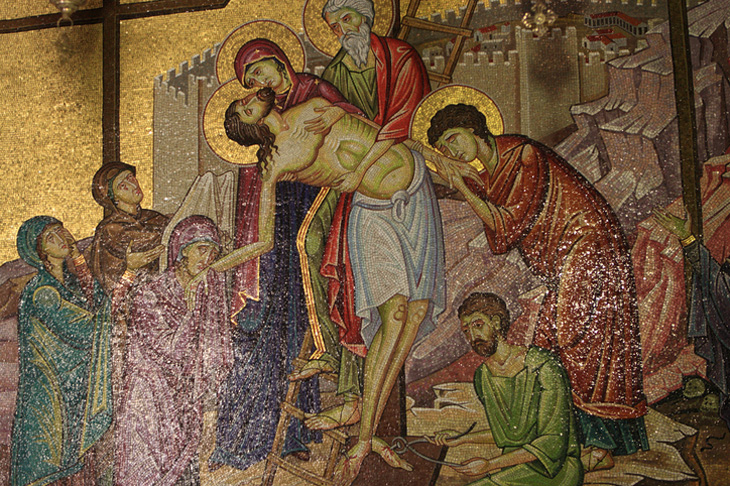It’s the oddest place to find a profound meditation on the death of Christ, but there it is on Radio 2 every year on the night of Good Friday, on the ‘light music’ station, and not on Radio 3 or Radio 4, where you might expect to find it. This year At the Foot of the Cross was sandwiched between Desmond Carrington — All Time Great and Sara Cox’s disco beats, the uncompromising reflections on the nature of belief adding a certain bite to the evening. Diane Louise Jordan and her host of guests at the Watford Colosseum (including the Bach Choir and the tenor Wynne Evans) created a sequence of words and music designed to encourage us to think about the grief of the disciples, the tyranny of Rome, the agony of Christ as he walked towards Golgotha.
This syncretism, the serendipity within the station schedules, goes back to the BBC’s roots in the 1920s when there was less division between ‘high’ and ‘low’ art, culture and entertainment, the schools of science and the creative arts. The smooth transitions between radically different programmes uproot complacency by disrupting the usual flow with something not quite in tune. When it works, the surprise generated by the unexpected intensifies the experience of listening and creates a clarity and immediacy of understanding. Even if the Manga version of the Gospel story on Friday night was a little rough, and not quite King James, it was a refreshing way to hear the events being told, in the words of the street, as they might once have been, while the Mozart excerpts, from his Requiem, provided consolation not by avoiding the despair but by expressing it.
Another surprise was to find a play about the writing of Bach’s St Matthew Passion on Radio 4, and not on 3, where you might have expected to come across it, especially since this was much less a drama than a tutorial on how to prepare for a performance of Bach’s masterwork. In James Runcie’s Bach: The Great Passion (directed by Eoin O’Callaghan), which goes out on air this evening, midway through the three-day vigil from Good Friday to Easter Day, we hear Bach (played by Simon Russell Beale) schooling his choristers, moving them from G major to B minor while asking them to imagine the pain of Christ’s journey to the Cross, to draw it into themselves and make it personal.
This could have been rather stilted; how dramatic can you make a sequence of scenes where there is no narrative thrust other than the need to get the notes right before the performance? Even when Lena, Bach’s wife, suffers a miscarriage, and loses so much blood her life is under threat, the music comes first, and what we begin to fear could develop into a terrible personal crisis is suddenly abandoned as a storyline. Lena (beautifully played by Melody Grove) returns to rehearsals sounding OK, without a further word about her state of health. But Russell Beale makes us believe he is Bach, and that we are back in 1727, or rather that 1727 is the present, and the composer is struggling in this very moment to turn the notes he has written into a very different telling of the Passion. Bach (or rather Russell Beale) explains how this was to be a new kind of oratorio and that listening to his music was to ‘become an act of faith in itself’.
This was a perfect example of ‘slow radio’ (which is coming to Radio 3 next month in a nine-hour special, so more on this later). To appreciate it, you need the time and space to listen slowly, not expecting to be moved by the storyline but by the thoughts provoked by what Bach has just said. ‘If we don’t confront our darkest fears they will haunt us till we die.’
Over on 3, the Free Thinking festival of talks and discussions, recorded over a single weekend at the Sage in Gateshead, always requires a lot of its listeners. You can’t listen to a talk about the neuroscience of sleep, or how to be calm in a fast-paced world, while chopping onions. To miss a word or two breaks the link and there’s no way back to understanding what’s being said. But My Body Clock Is Broken on Wednesday evening (produced by Zahid Warley) was worth sitting down for. Anne McElvoy chaired (with her characteristically crisp intelligence) a discussion about depression with a writer who has suffered from manic depression, an expert on ageing, a historian of medicine and a consultant who works with those who suffer from chronic fatigue. There was such wisdom here. How do we know when we’re about to cross that line from being just about OK to being very much not OK? Why routine, those seemingly trivial habits, the ‘fragile furnishings of the mind’, is so important when treating patients with dementia. Why narrative, now often underrated, is a valuable technique in therapy, making sense of a personal story, containing the distress while also providing a way of outlining and stating it. That’s something the Gospel writers (and Bach) understood.






Comments